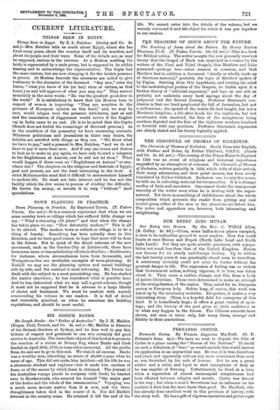• CITRRENT LITERATURE.
THINGS SEEN IN EGYPT.
, Things Been in Egypt. By E. L. Butcher. (Seeley and Co. 28. net.)—Mrs. Butcher tells us much about Egypt, where she has lived ninny years, about the country itself and its wonders, and about its people and their ways. Some of the details are, as may be supposed, curious in the extreme. At a Moslem wedding the bride is represented by a male proxy, but is supposed to be within hearing and to acknowledge her representative. The Copts had the same custom, but are now changing it for the bride's presence in person. At Moslem funerals the mourners are called to give testimony to the character of the deceased. "Say now," cries the Imam, " what you know of his (or her) vices or virtues, as God hears you and will approve of what you may say." They answer invariably in the same words: "He was the greatest good-doer in the world." It is satisfactory to know that the Moslem tone in respect of women is improving. "They are sensitive to the pressure of European opinion on this head," and, we may be sure, would relapse were the pressure withdrawn, just as sati and the immolation of Juggernaut would revive if the English raj in India came to an end. (It is to be noted that the Coptic Church does not forbid the remarriage of divorced persons.) As to the condition of the peasantry we have reassuring accounts. Whatever politicians and journalists in Cairo may desire, the fellahln are satisfied with things as they are. "We know what we have to pay," said a peasant to Mrs. Butcher, "and we do not have to pay it more than once. And if any one comes and desires to beat us to make us pay again, we have only to send a telegram to the Englishman at Assiout, and he will not let them." What would happen if there were no "Englishman at Assiont" or any- where else ? The chapters on the religions and festivals of Egypt, past and present, are not the least interesting in the book. A strict Mohammedan must find it difficult to accommodate himself to modern life. He must not take interest, and he has not the facility which the Jew seems to possess of evading the difficulty. He buries his money, or invests it in very "wild-cat" land speculations.






























































 Previous page
Previous page